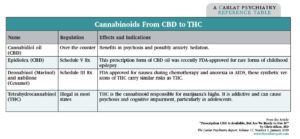Prescription CBD Is Available, But Are We Ready to Use It?
The Carlat Psychiatry Report, Volume 17, Number 1, January 2019
https://www.thecarlatreport.com/newsletter-issue/tcprv17n1/
Issue Links: Learning Objectives | Editorial Information | PDF of Issue
Topics: Anxiety | Cannabidiol | Free Articles | Psychopharmacology
Editor-in-Chief of The Carlat Psychiatry Report. Practicing psychiatrist, Winston-Salem, NC. Dr. Aiken has disclosed that he has no relevant financial or other interests in any commercial companies pertaining to this educational activity. Your patient comes in with a new medication on his list: CBD oil. He started taking it for anxiety and wants to know if it’s safe. You hedge, explaining that there is limited information available on unregulated products, but the patient is persistent. He says CBD oil is available as a prescription, and wonders if you could write one for it. Cannabidiol, or CBD, is a derivative of marijuana that has recently become available as a prescription drug, Epidiolex. It is FDA-approved for two rare forms of childhood epilepsy, Lennox-Gastaut and Dravet syndromes, and was fast-tracked for that indication because of the dire need for treatment in children with these intractable seizures. Meanwhile, the same drug has been available as a supplement for the past decade, called CBD oil. Many patients take this oil for its rumored mental health benefits, and you’ll need to know the basics when they request prescriptions for it. Table: Cannabinoids From CBD to THC CBD vs THC CBD in psychiatric disorders In addition to psychosis, there are a couple of small, placebo-controlled trials of CBD in social anxiety disorder. These looked at the drug’s acute effects when taken before a stressful social situation in 34 subjects. Compared to placebo, CBD had a significant effect, bringing anxiety down to the same levels reported by healthy controls (Blessing EM et al, Neurotherapeutics 2015;12(4):825–836). Somnolence is the main side effect with CBD, but studies in sleep are mixed. Tolerance can develop to its sedative effects, and low doses (below 160 mg) can be stimulating (Babson KA, Curr Psychiatry Rep 2017;19(4):23). CBD does not appear to help bipolar mania or the cognitive impairments of schizophrenia. CBD oil or Epidiolex? In terms of purity, CBD oil is a gamble. In a study of 84 online products, only 30% contained the amount of CBD on the label, and 21% contained THC (Bonn-Miller MO et al, JAMA 2017;318(17):1708–1709). The FDA keeps a running tally of unacceptable products at www.fda.gov/NewsEvents/PublicHealthFocus/ucm484109.htm. Another good source is Consumer Labs, which tests products for purity and integrity. Among their recommended options, the best-priced oils are available at elixinol.com and bluebirdbotanicals.com. The dosages used in psychiatric research range from 300 mg/day for anxiety to 800–1,200 mg/day for schizophrenia. The epilepsy dosage, 10–20 mg/kg/day, adds up to around the same amount used in schizophrenia for most adults. Cost is an issue with CBD, prescribed or not. A 300 mg dose is $20–50/day in the over-the-counter form and around $35/day for the prescription when paying out of pocket. CBD, Marinol, and medical marijuana Side effects and drug interactions CBD may raise the levels of psychiatric medications through inhibition at UGT2B7 (lamotrigine, lorazepam) and CYP2C19 (diazepam and several SSRIs and antipsychotics). CBD itself is metabolized by CYP3A4 and CYP2C19. Risks vs benefits While we sort out these dilemmas, patients will no doubt experiment with the readily available CBD oil, so what should we do in the interim? We recommend the following commonsense approach. TCPR Verdict: We don’t have much evidence to endorse or warn against CBD. Though it’s premature to prescribe CBD, we should guide patients to safer products if they are getting it on their own. That’s harm reduction, like suggesting to casual drinkers that red wine is safer than vodka
 Chris Aiken, MD
Chris Aiken, MD
Marijuana (cannabis) is a blend of over 100 cannabinoids, only one of which is tetrahydrocannabinol (THC), the cannabinoid that is most responsible for the high people get from consuming pot. CBD, on the other hand, does not cause a “high,” although many people consider it to be somewhat tranquilizing. CBD also does not cause some of the problems seen with THC, such as cognitive impairment, anxiety, and (more rarely) psychosis. Those dangers are particularly relevant to adolescents, where the latest data show that marijuana triples the risk of psychotic disorders (Jones HJ et al, JAMA Psych 2018;75(3):240–246). CBD has neuroprotective properties, and it may actually lower the risk of psychosis and anxiety with THC. For more information, see the table “Cannabinoids From CBD to THC” above.
In one of the most paradoxical clinical findings in recent memory, it turns out that CBD, far from causing psychosis, may actually be an effective treatment for psychosis. So far, 5 out of 7 controlled trials of CBD’s antipsychotic effects have been positive, and the latest of these is reviewed in this issue (Epidemiol Psychiatr Sci 2018;27(4):327–335). Another prescription CBD product, Arvisol, is undergoing phase I clinical trials in schizophrenia.
Are CBD oil and Epidiolex really the same drug? They are both CBD, short for cannabidiol, but where they differ is in their purity and regulatory status. Epidiolex is a Schedule V prescription drug, the lowest level of regulation for a controlled substance. CBD oil is an over-the-counter supplement. It is legal in all states as long as it’s extracted from the hemp plant, a variety of cannabis that contains little THC and produces no high.
CBD is in a very different category than dronabinol (Marinol) and nabilone (Cesamet), the other prescription cannabinoids. These are synthetic isomers of THC (Δ-9-THC) and are under tighter regulation than CBD (Schedule III vs Schedule V). They are only approved for nausea during chemotherapy and, in the case of dronabinol, anorexia in AIDS. As pure THC compounds without the protective effects of CBD, they may have even more psychedelic effects than marijuana (Bhattacharyya S et al, Neuropsychopharm 2010;35(3):764–774). “Medical marijuana” can refer to any marijuana component, such as CBD, or to the plant itself. It usually refers to the plant, which is legal with a prescription in 33 states and Washington DC. Each state has its own list of conditions that medical marijuana is approved for.
The World Health Organization concluded that CBD has “a good safety profile” (WHO, 2018). Somnolence is its main side effect, and the PDR warns of elevated liver enzymes. On drug screens, CBD can cause a false positive for THC.
The FDA fast-tracked the approval of Epidiolex (CBD) because its risk-benefit profile is favorable for rare forms of epilepsy that are difficult to control with current anticonvulsants. The bar is higher for disorders with existing treatments, like psychosis and anxiety, and the data in these conditions are scarcer.



